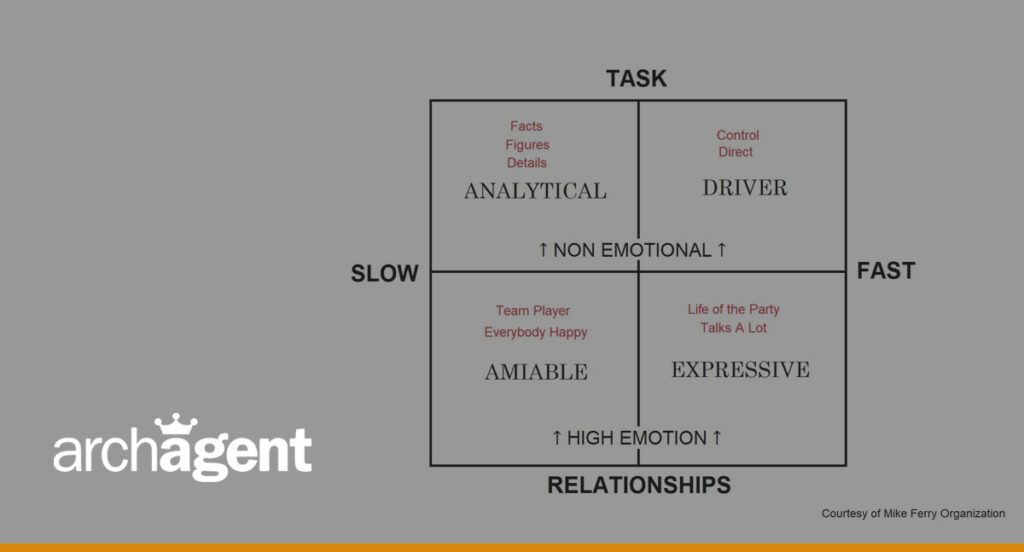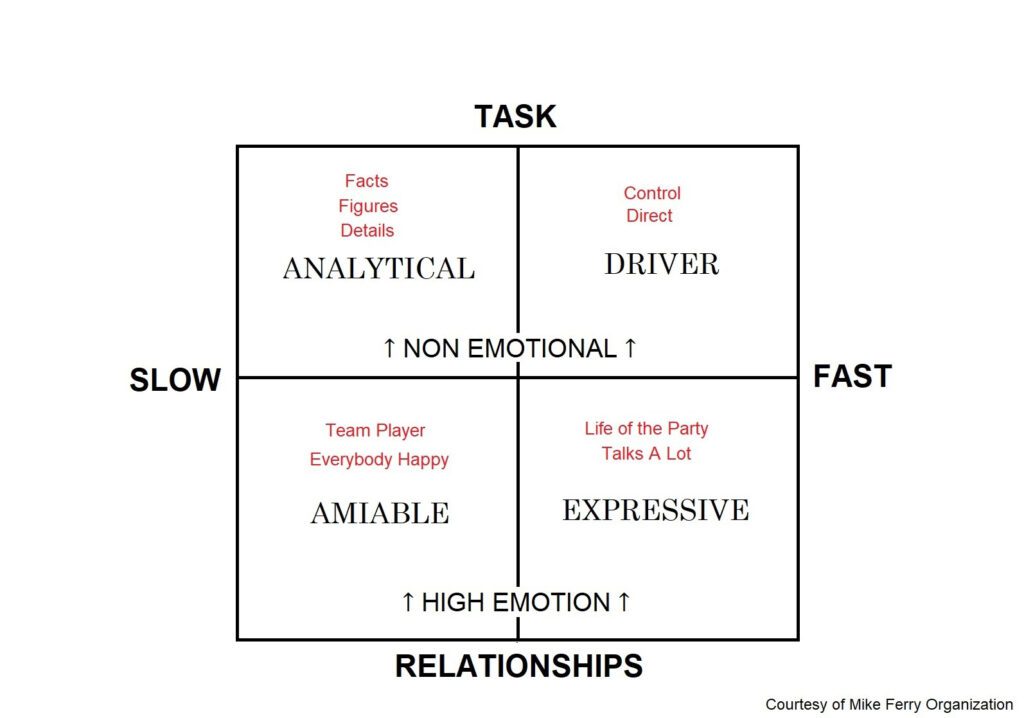
At a recent Mike Ferry Productivity School, Tony Smith, Vice President at the Mike Ferry Organization, discussed how learning the four personality types could help you win more listing presentations.
The most important service you sell is yourself. To effectively communicate the value you bring to your potential sellers, you must understand their personality type. The challenge is most of us only view people through our own personality type.
To improve your odds of winning more listing presentations, you must be able to adapt – or become “versatile” – by altering your personality type to respond in kind to the prospect’s personality type. In all business interactions, one party adapts to the other party’s personality type. If you don’t adapt to your prospect’s personality type, they will adapt to yours. However, it’s human nature to feel more comfortable when someone else mirrors our personality type – and people prefer doing business with people they like, trust and are comfortable with. You can either learn to respond to others’ personalities and make them comfortable, or they will respond to yours and feel less comfortable.
But, before you can assess and adapt to other people’s personality types, you must first understand your own. Assess yourself, talk to your spouse, significant other, friends and kids. Listen to them. Take a personality type quiz – you can find many online. Identify your type.
There are 4 Personality Types. Which One Are You?
- Driver: Results Oriented. Very direct, in control. Makes fast decisions, low on emotion. Doesn’t need to know how to get there; just needs to get there.
- Analytical: Detail Oriented. Makes slow decisions. Must know “why” and explore “what if?” Needs to know everything, detail focused. Gets annoyed easily. Understands the value of following processes.
- Amiable: Understanding Oriented. Makes slow decisions. High level of caring and concern for others, often puts the needs of others first, conversely delays addressing their own needs. Team player. Highly emotional, gets offended easily. These personality types often make very good realtors.
- Expressive: Excitement Oriented. Makes fast decisions. The life of the party walks into a room and lights it up. Full of energy. Lives for the moment and seeks a good time, rarely concerned about consequences or the future.
To hone your ability to quickly determine a prospective seller’s personality type, you should commit to diagnosing every prospect’s personality type when you first meet them. Once you’ve diagnosed their personality type, you can adjust yours and interact with them in a manner that makes them feel comfortable.
But how do you adapt? The key is versatility.
The Art of Versatility
Versatility is the single greatest competitive advantage you possess. And best of all it’s free. To become versatile, you must surrender your ego. The first step to surrendering your ego is to ask yourself, “What do I refuse to give up?” Then, implement action steps and do things you normally wouldn’t do. In other words, instead of,
- I don’t eat this: eat it
- I don’t read this: read it
- I don’t watch this: watch it
- I don’t door knock: go door knocking
- I don’t prospect these lead types: prospect them
By becoming versatile you become malleable, which enables you to effectively communicate to all the personality types.
Presenting to the 4 Personality Types
When presenting to the different personality types, consider these ways to adapt your communication:
- Driver: Let them know that time is of the uttermost importance to you. Tell them you move quickly and if you get their affirmation, you’ll help them move fast too. Drivers do not like clutter, so make sure you are dressed professionally, refer to your written notes and have a clean and tidy car.
- Analytical: Ask them what facts and figures they would like to see. Analytics believe they know what’s best, so they will love to tell you. Confirm with them that their preferred facts and figures are of great importance.
- Amiable: Ask them to tell you what they love most about their home. Let them know you love their home as much as they do and are confident the next buyer will too. Let them know about all the neighbors you have also worked with. Talk about the importance of relationships.
- Expressive: Tell them what’s best and worst about their home, neighbors, schools and restaurants. Ask them, “What are the best three features of your home? The three worst? The three best restaurants in the area?”
Example Dialogue
Here are some sample dialogs to get you going.
Example 1
You’ve identified yourself as a driver and your seller is amiable. During the prequal meeting the seller says, “Thank you so much for your time, I really appreciate all the work you did prior to us meeting.” As a driver, you’d typically respond, “Sure no problem.” But here is a time to let your versatility surface! A better response would be, “Thank you so much for caring about my time and effort. I was just telling my wife how much I enjoyed meeting you. Let’s carve out some time to get together to acknowledge the agreement. Does tomorrow or the next day work better?”
Example 2
You’ve identified yourself as an analytical and the seller is expressive. The seller says, “I was thinking when we sell our home, we could let the buyer know we drew up plans for a renovation and offer to include them.” As an analytical you’d typically respond, “Well let me see the plans. We want to be sure that they are up to code and what the tax ramifications would be. Maybe we can offer them as an option. Let’s talk about it and discuss all the variables.” That’s not what the amiable wants to hear. They don’t care about those things – they are just excited for someone to see their plans. If you stick to your analytical personality, the seller is going to mimic you and delay signing the listing agreement – and you risk losing it. A better response would be to exercise your versatility, mimic the seller and respond, “Oh my, that’s a great idea! It would be so much fun to see the next owner of your home enjoy living here as much as you have and realize your vision for the extension.”
ArchAgent brings together the tools and resources the country’s top real estate agents rely on in a single package for a low cost. With the shift in the market, Expired Listings are becoming more and more common. To be the best, become an ArchAgent.

Steve Cortez is a seasoned real estate professional with decades of experience and owner of ArchAgent. ArchAgent brings together the tools and resources the country’s top real estate agents rely on in a single package for a low cost.
